“Soldiers of my Old Guard! Farewell, my children!
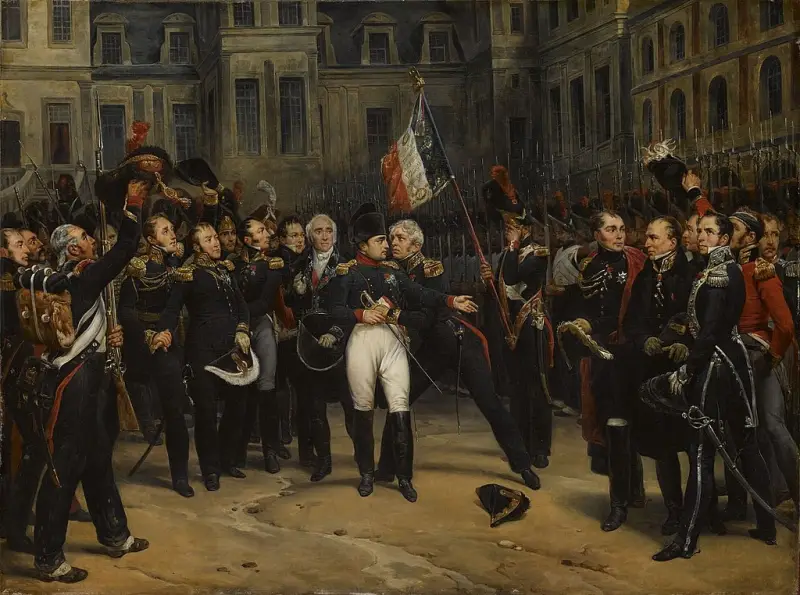
Napoleon's farewell to the Imperial Guard. Antoine-Alphonse Montfort
General situation
On March 30, 1814, French troops were defeated in the Battle of Paris, and Marshal Marmont surrendered the city. On March 31, the allied armies led by the Russian Emperor Alexander I entered Paris (“We saw Paris with a sword in our hands!”).
Meanwhile, Napoleon, having learned that the allied armies were marching on Paris, rushed from Saint-Dizier (28 km east of Paris) on March 180 to save the capital, but was too late. Napoleon walked with the army to Villeneuve-sur-Yon, then, taking with him several of his closest comrades-generals Caulaincourt, Drouot, Lefebvre, Gourgaud, he mounted post horses. On the night of March 31, at one of the stations, the emperor learned about the fall of the capital. The enraged Napoleon wanted to immediately lead his small army to Paris. But he quickly cooled down and headed to Fontainebleau.
The emperor sent Foreign Minister Armand de Louis Caulaincourt to Paris to prepare a peace agreement on the terms of the Chatillon Congress. The most prominent French politician, Charles Maurice de Talleyrand, betrayed Napoleon (Bonaparte wanted to arrest him many times, but for some reason did not), remaining in the capital. On March 31, Alexander I signed a declaration drawn up by Talleyrand and Secretary of State Nesselrode, in which he refused to negotiate with Napoleon and expressed his readiness to recognize the government that the French nation would elect.
On the same day, the royalists tried to throw off the statue of Napoleon in a Roman toga by the sculptor Antoine-Denis Chaudet from the Vendôme Column, built in honor of the victories of the Grande Armée, and destroy the monument itself. Russian historian A.I. Mikhailovsky-Danilevsky wrote:
The Russian Tsar Alexander I spoke out against the Vandals and ordered a guard to be posted. Police said that the monument is under the patronage of the Russian emperor and his allies. That the characters will be replaced. A week later, the statue of Napoleon was dismantled by decision of the French Provisional Government, and a white flag with lilies, symbolizing the Bourbon dynasty, was installed in its place.
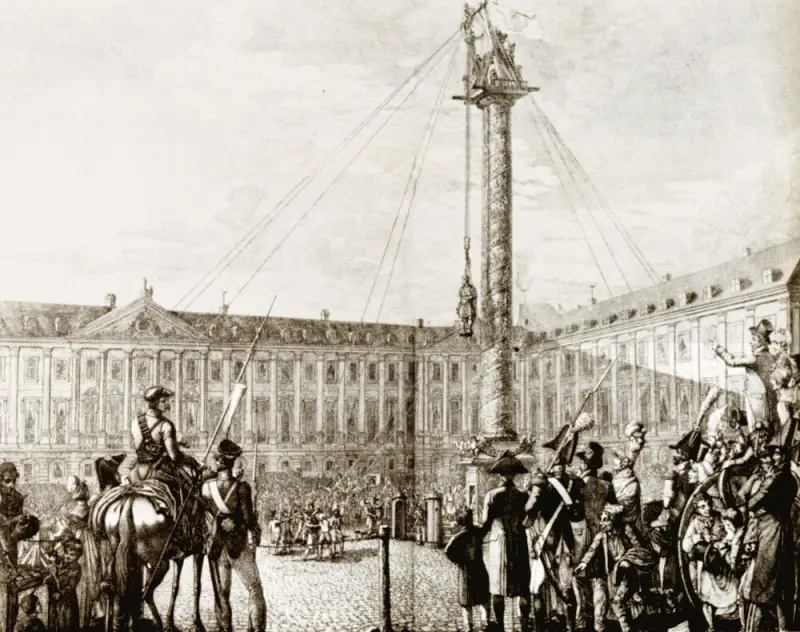
Removing the Napoleon statue from the Vendôme Column. Hood. Georg-Emmanuel Opitz
In the evening of the same day, Alexander I stopped at Talleyrand's house, where a meeting of military leaders, diplomats and dignitaries took place. The question of the political future of France was being decided. The Allies did not have a ready solution. Therefore, the Russian sovereign was ready to discuss any option: the regency of Marie Louise under Napoleon II, the restoration of the Bourbons, the enthronement of Bernadotte, or the proclamation of a republic.
The French present insisted on the restoration of the Bourbons.
Alexander Pavlovich noted that during the campaign of 1814 he did not notice a large number of supporters of royal power, rather the opposite. The Tsar was impressed by the battles, when French soldiers fought bravely and died with the words “Vivat Emperor!” Only a small part of the French population supported the Bourbons.
At the end of the meeting, Alexander I said that it was not the business of foreigners to overthrow Emperor Napoleon or return the Bourbons to the throne. This is an internal affair of the French. Alexander Pavlovich believed that the restoration of royal power required the consent of the majority of the French. Talleyrand assured the Russian Tsar that there was such agreement.
On April 1, Talleyrand gathered the senators who remained in Paris, and they proclaimed the creation of a provisional government led by Talleyrand, which was supposed to prepare a new constitution for the country. The brother of the executed Louis XVI, Louis XVIII, was called to the throne. One of the members of the provisional government was General Pierre de Ruel Bernonville, a close friend and ally of Marshal MacDonald.
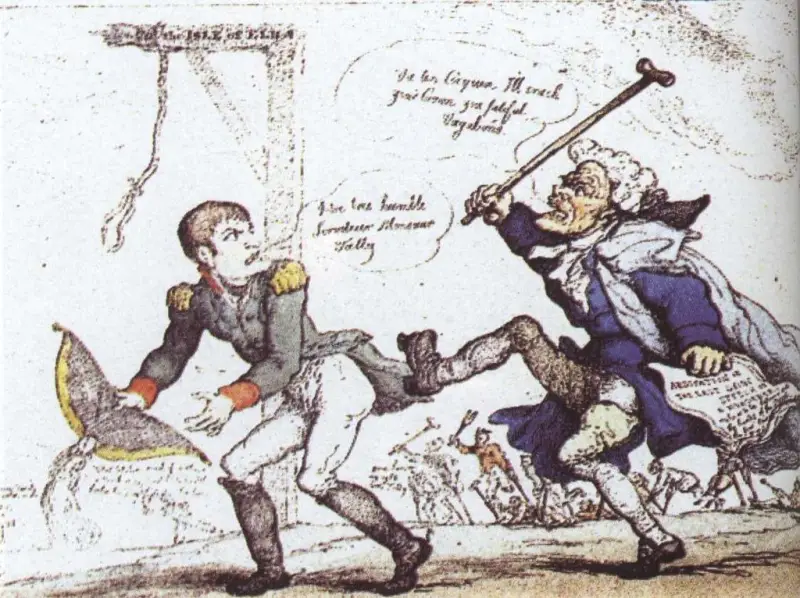
Caricature from 1814: Talleyrand drives Napoleon away
Caulaincourt tried to protect Napoleon's interests, reminded senators and other influential persons of the favors that the emperor showered them with, but his card was beaten. The political situation has changed. Senators felt it was time to adjust to the new political reality.
Caulaincourt was unable to raise the issue of Marie-Louise's regency under Napoleon's son. On April 2, the Senate declared Napoleon and his family deprived of the throne. True, of the 140 senators, less than half were present. Some were with Napoleon, others were with Louise-Marie in Blois, others did not come.
Caulaincourt met with Alexander and tried to convince him to start negotiations with Napoleon. But the Russian sovereign did not want any negotiations with Napoleon, since “France and Europe need peace and cannot have it under Napoleon,” he demanded his abdication. At the same time, Alexander Pavlovich promised to forget all the evil that Napoleon brought to Russia, and expressed his readiness to provide him with any honorable asylum, including in Russia.
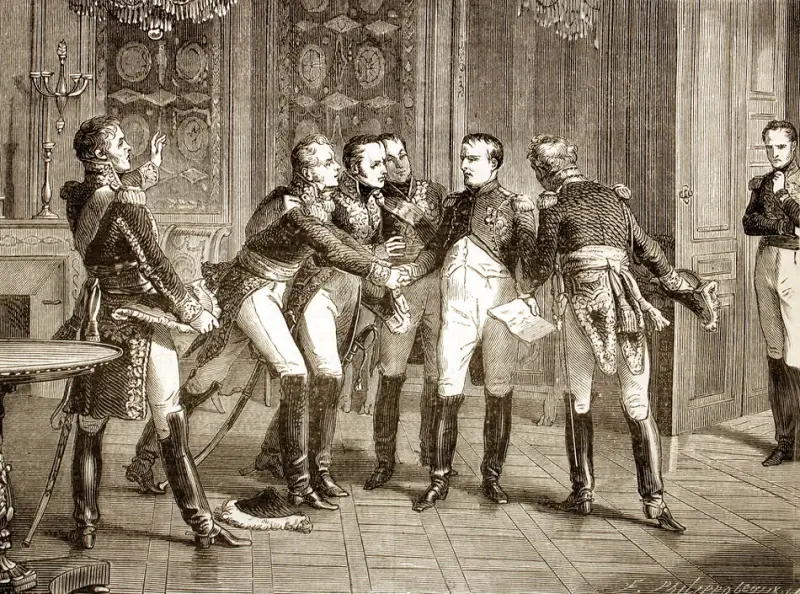
Napoleon, under pressure from the marshals, signs an abdication of the throne in favor of his son at Fontainebleau. Felix Emmanuel Henri Philippoteau. Illustration for the book by Adolphe Thiers "History Consulates and empires"
Napoleon at Fontainebleau
At this time, Napoleon in Fontainebleau near Paris was engaged in the organization of the army, upset by the last battles, forced marches and desertion. He was going to gather all his remaining forces into one fist, regroup them and go on the attack again.
All marching regiments were sent to form line regiments. Mortier's corps was reinforced by Boyer de Rebeval's division; Marmont's corps - the divisions of Compan and Ledru, two battalions of veterans and the remnants of the Paris garrison. Both corps, which lost almost all their artillery in the battles of Fer-Champenoise and Paris, received 30 guns with full ammunition.
Foot gendarmes from three departments: Seine, Seine and Marne, Seine and Oise, were organized into battalions and, together with gendarmes from Friant's division, formed a special brigade. Mounted gendarmes and selected squadrons made up one of the regiments of the Lefebvre-Denuette division. From all the remaining regiments, a division was formed under the command of Krasinski.
Napoleon planned to continue recruiting horse and infantry reserves. About 60 thousand soldiers remained under Napoleon's command (according to other sources, 36 thousand). Also on the territory of France there were also groups of Augereau and Soult.
The arrival of Caulaincourt took away Napoleon's last hope of resolving the matter through negotiations. He wanted to continue the campaign. The soldiers and officers, despite the fall of Paris and the attempts of the royalists to lure them to their side, loved the emperor and were devoted to him. He had one more reserve - Napoleon could start a people's war. However, he himself did not want this. And his marshals were tired of the war and believed that further sacrifices were pointless.
Napoleon planned to march on Paris and concentrated troops on April 3–4. On April 3, the guard was built on the castle square. The French emperor drove along the front of the troops and, stopping in the middle of the square, addressed the officers and soldiers with a speech: “Soldiers! The enemy, three marches ahead of us, captured Paris; we must drive him out. The unworthy French, emigrants, spared by us, hoisted the white banner and joined our enemies. Cowardly! They will be punished for this new crime. Let us swear to conquer or die, and we will force you to respect the tricolor cockade, which we have worn for twenty years in the field of glory and honor.”
The guard answered the emperor: “ We swear to it!” The infantry and cavalry passed Napoleon. The soldiers greeted their leader: “Long live the emperor! In Paris! In Paris!" The troops began to move towards Paris.
The Allies, having received news of the movement of French troops, also began to move troops to positions near Paris. In the vanguard was Raevsky's corps, in the first line there were also the Austrian corps of Giulai, the Württemberg corps and the Bavarian corps of Wrede. The guard and reserves with the main headquarters remained in Paris. Corps of the Silesian Army were also located in the Paris area. In total, the Allies had up to 180 thousand soldiers in Paris and its environs.
On April 4, Chernyshev’s detachment captured a French artillery park on the Orleans road, which was moving under the cover of 800 soldiers. The regiments of Zhirov, Sysoev and Vlasov struck suddenly, from an ambush. The French fled. Russian troops captured 22 guns and many prisoners. General Chernyshev, having learned from the prisoners that another artillery park had passed here earlier, gave chase. In the evening, Russian troops stormed the city of Pithiviers, which was defended by up to 200 French rangers. However, it was not possible to overtake the artillery park.
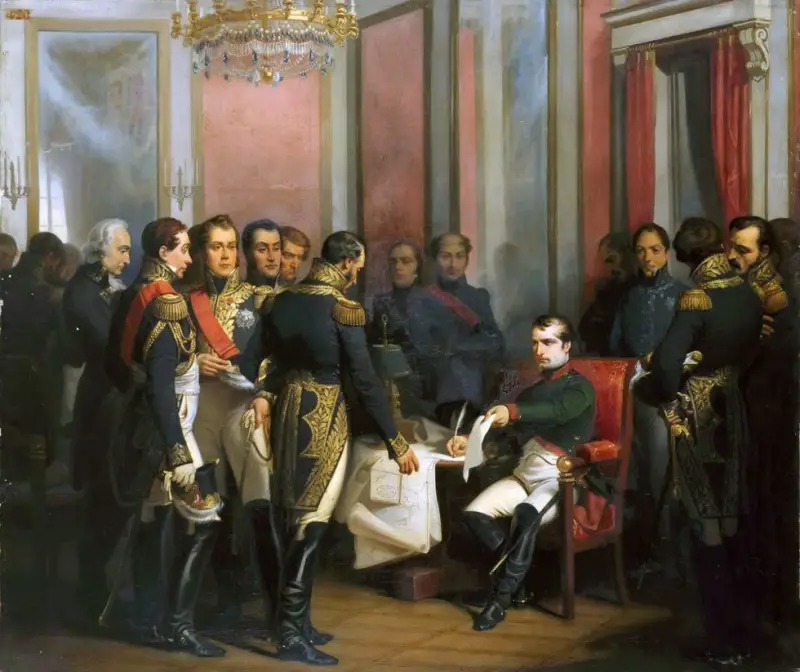
Napoleon, in the presence of marshals, abdicates the throne at Fontainebleau on April 4, 1814. Francois Bouchaud.
Marshals' Mutiny
The preparation of the allied command for a new battle turned out to be unnecessary. The French marshals did not want to participate in a desperate and suicidal attack on Paris. They were tired of constant war, military leaders received awards, huge estates and rich possessions, but could not use them. They wanted to “live for themselves,” peace and stability. The royalists put pressure on them, forcing them to rebel and go over to the Bourbon side. Some had families in Paris and feared for the lives of their households and for the fate of their possessions. As a result, the marshals decided to oppose Napoleon.
On April 4, the famous marshals Ney, Oudinot, Lefebvre, MacDonald, and Moncey entered the emperor’s chambers. Napoleon's cabinet already included Berthier, Marais, Caulaincourt and other senior dignitaries of the French Empire. The marshals were sad and did not dare to start a difficult conversation, and Napoleon, guessing their intentions, asked if there was any news from Paris. Ney replied: “We have, and very bad ones.”
Napoleon tried to cheer up the military leaders, convincing them of the opportunity to take advantage of the scattered position of the allied corps, which were located on both sides of the Seine. He talked about the possibility of assistance from the Parisians, which would make it easier to expel the enemy from Paris. There were also other troops: Eugene had up to 36 thousand soldiers, Augereau - 30 thousand, Suchet - 20 thousand, Soult - 40 thousand people. By combining these forces, it was possible to push the allies back to the Rhine, save France and make peace.
However, the marshals did not share his hopes. They clearly expressed their desire - Napoleon's abdication of the throne. MacDonald said they were not prepared to "fight on the ruins of our capital, covered with the corpses of our children." True, he did not dare say that he would refuse to carry out the order, saying that “the troops are unlikely to carry out such an order.” Marshal Ney said that he would not budge, like his troops. At the same time, the marshals spoke out against the Bourbons and expressed their readiness to support the candidacy of Napoleon's son.
Napoleon could give the order, and the grenadiers loyal to him would suppress any rebellion. But the demarche of his old military comrades demoralized the emperor. He was disappointed. Napoleon decided to try again to start negotiations and send Caulaincourt, Ney and MacDonald to Paris. He expressed his readiness to abdicate in favor of the son of Napoleon II (King of Rome) during the regency of the Empress.
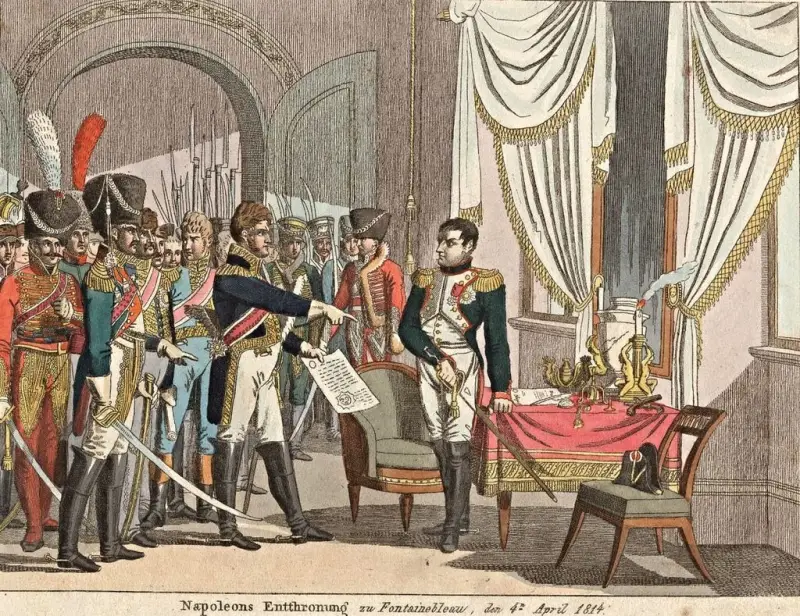
Napoleon's abdication of power. Fontainebleau, April 4, 1814 Friedrich Kamp
Marmont's Betrayal
The commissioners arrived in Essonne and met with Marmont there. He was invited to join the delegation. However, the marshal coldly accepted this proposal. He, considering further war disastrous, had already entered into relations with the provisional government and the Austrian Prince Schwarzenberg.
Initially, Marmont, under various pretexts, refused to join Caulaincourt. Marmont then admitted that he, having discussed the situation with the generals subordinate to him, decided to recognize the provisional government. The Marshal promised to move with his troops to Versailles, to the road leading to Normandy, and to obey the orders of the provisional government.
Thus, Marmont betrayed the emperor, weakened his army by 8 thousand soldiers and opened the road to Fontainebleau. From that time on, the word “Ragusa” (the marshal was the Duke of Ragusa) became synonymous with the word “traitor” in France, and the verb “raguser” appeared in French, which translated means “mean to betray.”
Marmont did not have a strong character and under the pressure of his associates agreed to abandon the promise given to Schwarzenberg and go to Paris. Subordinate troops were to remain in their previous positions. However, the deal has already been done. Schwarzenberg agreed to cancel the previously concluded condition, but it was already announced. As a result, Napoleon lost much as a contracting party, the allies now knew that there was discord in the French camp and that you could push through your conditions.
During negotiations with the provisional government and the allied command, Napoleon's marshals stood for the rights of the King of Rome, refusing to recognize the Bourbons. They sought to show that this concession should be made to troops who were loyal to the emperor and would yield only if the rights of Napoleon's son were preserved. The Senate's decision was considered illegal by Ney and MacDonald. Alexander listened carefully to Napoleon's envoys and gave them hope. He promised to discuss the matter with the Prussian king. The next day the negotiations were going to continue.
At this time, Marmont's corps went over to the Allied side, which decided the outcome of the negotiations. Napoleon sent an officer to accompany Marmont or the general replacing him to him at Fontainebleau to discuss a possible operation to attack Paris. General Sugam (Suam), who led the corps in the absence of Marmont, decided that Napoleon had learned about the secret agreement between the corps command and the allies and wanted to arrest or shoot the traitors. The generals decided to cross the Essonne River and place themselves at the disposal of the provisional government.
On April 5, the corps changed its location. The soldiers and officers did not know about the betrayal; they thought that they were approaching enemy troops to attack them. In addition, there were rumors about the abdication of the emperor. Only one division of Lugott refused to carry out Sugam's order and move to Versailles.
Marmont, having learned about what had happened, cried out: “I'm dead! I am dishonored forever!” True, later, when he was surrounded by the flattery of Talleyrand and his like-minded people, Marmont tried to forget about his act, which forced Napoleon to sign the act of abdication. He even went to the corps and calmed down the soldiers who wanted to revolt and kill the traitor generals.
The Russian emperor, having negotiated with the Prussian king and Schwarzenberg, showed some compliance with regard to the regency of Marie-Louise. The French delegation had hope. At this time he was informed about the transition to the side of the provisional government of the 6th Corps. The Allies declared that only the Bourbons could take the French throne. They promised to treat Napoleon and his family with respect. Alexander told Caulaincourt that Napoleon would receive the island of Elba. In addition, he will try to provide Marie-Louise and her son with ownership in Italy.
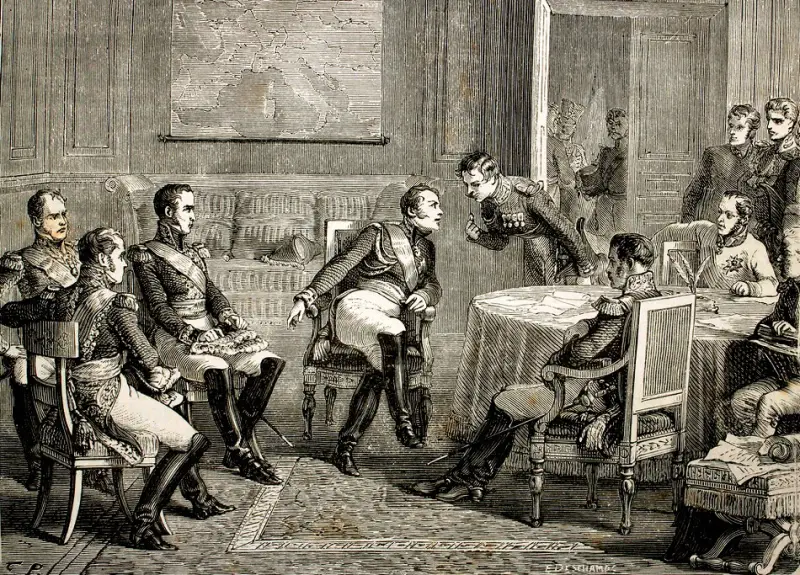
Alexander I decides the fate of the Bourbons after learning about the defection of Marshal Marmont's corps to the side of the allies. Illustration for the book “History of the Consulate and Empire” by Adolphe Thiers
Renunciation
5 April Napoleon's envoys returned to Fontainebleau. The emperor knew about the deposition of the 6 corps, therefore he perceived bad news calmly. At first he thought of leaving the Loire and continuing the war there with troops loyal to him. Spent a sleepless night.
On the morning of April 6, calling all the marshals, the emperor declared: “Gentlemen, calm down! Neither you nor the army will have to shed any more blood. I agree to abdicate... I would like for you, as well as for my family, to ensure the succession to the throne for my son... This would be possible, but low treason deprived you of the position that I would like to ensure for you. If it were not for the departure of the 6th Corps (Marmont), we would have achieved both this and another, we could have raised France. But it turned out differently. I submit to my fate, you too submit to yours. Resign yourself to living under the Bourbons and serve faithfully. You wanted peace - you will get it. But, alas! May God please me to be mistaken in my premonitions, but we were not a generation created for peace. The peace you desire will mow down more people from your midst on your feather beds than a war would mow down in bivouacs..."
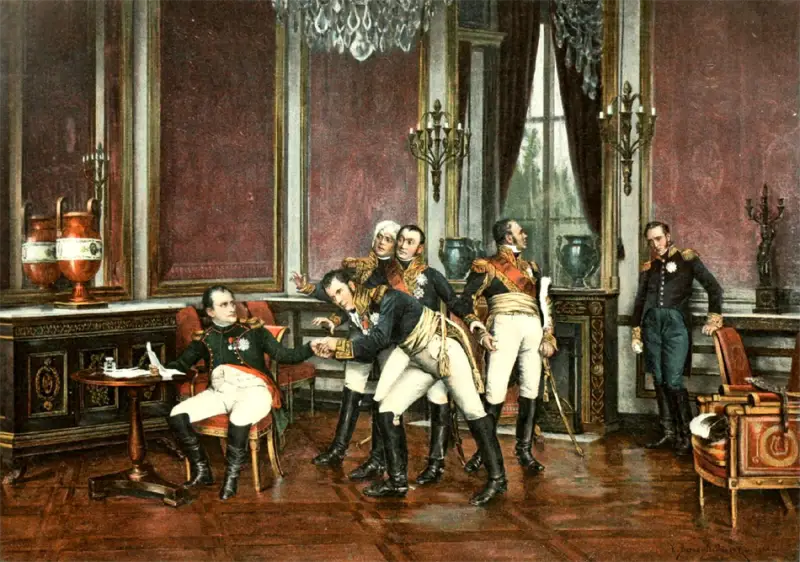
Napoleon's abdication, April 6, 1814. Etienne Prosper Bern-Belcourt
Taking a piece of paper, Napoleon wrote an act of abdication in his sweeping handwriting: “In view of the declaration of the Allied Powers that the Emperor Napoleon is the only obstacle to the restoration of peace in Europe, the Emperor Napoleon, true to his oath, declares that he renounces for himself and his heirs the thrones of France and Italy, for there is no personal sacrifice, not even excluding the sacrifice his own life, which he would not be willing to sacrifice for the good of France.”
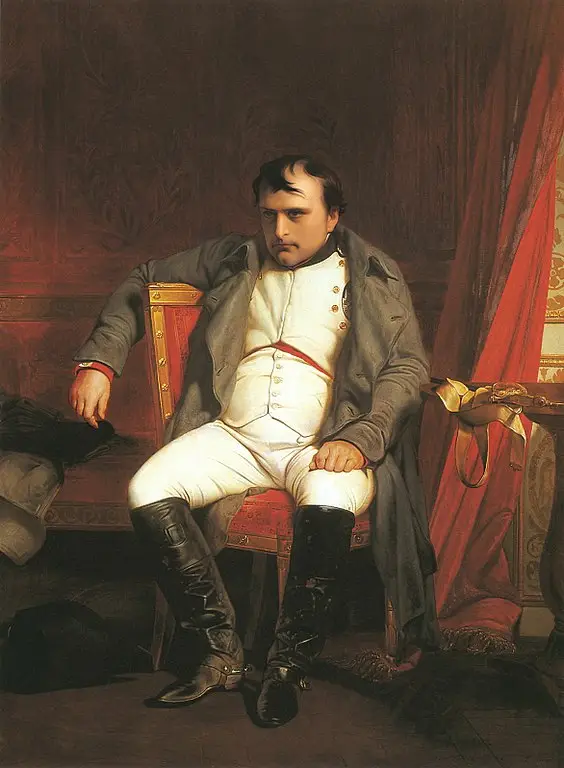
After the abdication at the Palace of Fontainebleau. French artist Paul Delaroche (1845)
Ney (who had declared his loyalty to the new government the day before), MacDonald and Caulaincourt took the abdication to Paris. The capital breathed a sigh of relief. The war is over! On the same day, the Senate proclaimed Louis XVIII king of France.
The Fontainebleau Palace quickly emptied. Napoleon's former associates were in a hurry to take their rightful place at the new court. Of the emperor's closest people, the generals Drouot and Bertrand, the Duke of Bassano (Marais) and Caulaincourt remained faithful to him to the last.
Marshal MacDonald remained among the former emperor's devoted associates. During their last meeting, on April 13, Napoleon expressed his gratitude to MacDonald: “I have done so much for others who abandoned and betrayed me, and you, who owe me nothing, remained faithful to me. I appreciated your devotion too late and sincerely regret that I can only express my gratitude in words.” Bonaparte presented the marshal with a magnificent saber inherited from Murad Bey. “Keep it in memory of me and my friendly feelings for you,”- said Napoleon.
Touched MacDonald in turn said: “Sire, I will keep her for life; If I ever have a son, I will pass it on as my most valuable family asset!” They hugged tightly and parted, never to meet again.
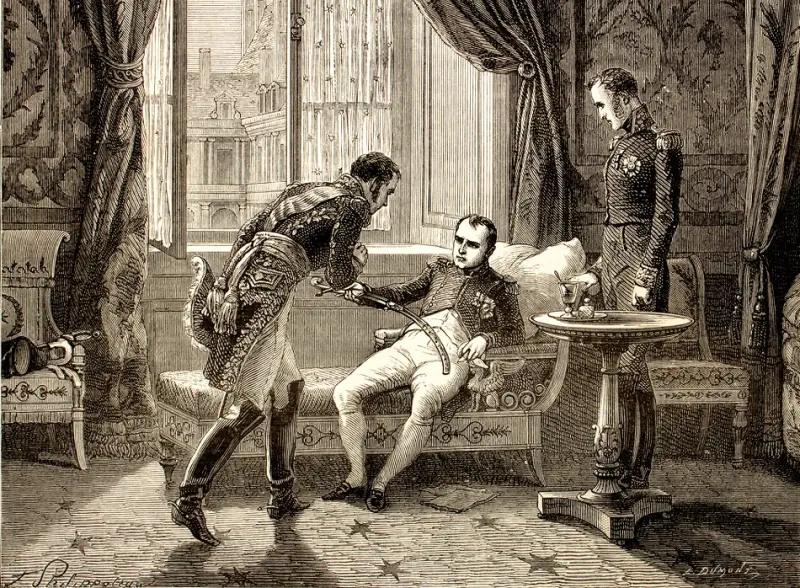
Napoleon presents Murad Bey's saber as a souvenir to Marshal MacDonald. Felix Emmanuel Henri Philippoteau
Many people, who were not only secret enemies, but also showed loyalty, began to throw mud at the former ruler. Among the fair censures there were many false ones.
Ordinary soldiers, non-commissioned officers and officers who suffered the most from Napoleon's aggressive campaigns, went through fire and water with him, and had the most right to hate the emperor for the hardships that he brought them, they did not betray him. His soldiers were still ready to give their lives for the emperor. As soon as Napoleon appeared in the castle courtyard, soldiers and officers greeted him and asked him to lead him to the enemy, to the last battle.
On the night of April 7–8, the huntsmen and grenadiers of the Old Guard marched through the streets of Fontainebleau, shouting: “Long live the Emperor!” Down with traitors!” Napoleon, realizing that the last massacre would not change anything and that the empire’s military machine had collapsed, instructed his remaining associates to calm the soldiers.
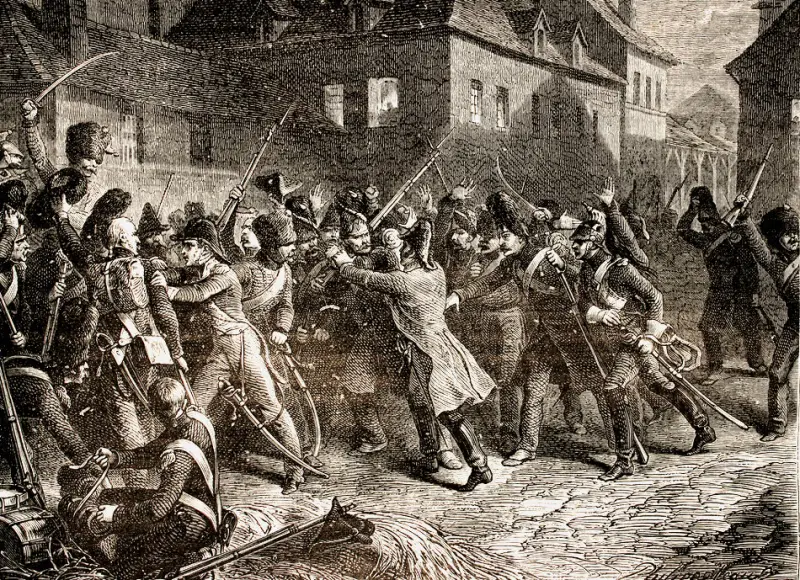
Military mutiny in Fontainebleau on the night of April 7–8. Felix Emmanuel Henri Philippoteau. Illustration for the book “History of the Consulate and Empire” by Adolphe Thiers
Funeral service for the “sons of the North” and the last battle of the 1814 campaign
Napoleon's abdication took place during Holy Week. And on Easter, April 10, on Concord Square, at the site of the execution of the French king Louis XVI, to the amazement of the townspeople, Tsar Alexander ordered the Easter liturgy to be served with a large Orthodox choir, in the presence of Russian troops and a French crowd.
The altar was installed on a platform built on the site of the scaffold where Louis XVI was beheaded. After the parade of troops, Tsar Alexander and the Prussian King Frederick William III climbed the steps to the dais, where Orthodox priests had already gathered and offered thanksgiving prayers to the Lord for their happy successes. The French marshals were also present and were forced to kneel when they announced this amid the thunder of Russian cannons.
Emperor Alexander I in a letter to Golitsin noted:
The Russian Tsar, according to the Orthodox ritual, publicly prayed together with his people and thus, as it were, cleansed the bloody place of the torn apart royal sacrifice. Our spiritual triumph has fully achieved its goal...
It was even funny for me then to see how the French marshals, how the numerous phalanx of French generals crowded near the Russian Orthodox cross and pushed each other in order to be able to venerate it as quickly as possible.”

Thanksgiving service of the Allied armies at Place Louis XV in Paris on April 10, 1814. Ignatius Sebastian Klauber from the original by Giuseppe Bajetti
On the same day, the last battle of this campaign took place in the south of France.
Anglo-Spanish troops under the command of Duke Arthur of Wellington stormed Toulouse, which was defended by the troops of Marshal Soult. The French took the blow and fought fiercely to defend their land. The Spaniards did not want to fight; the British were chasing them. The battle was very bloody: the French lost more than 2,5 thousand people, the allies more than 5,5 thousand soldiers.
On April 11, Soult, fearing encirclement, left Toulouse. Wellington occupied the city on 12 April. He was welcomed by local royalists. On the same day, a message came about Napoleon's abdication. On April 17, Soult, having received confirmation of the emperor's abdication, stopped resistance.
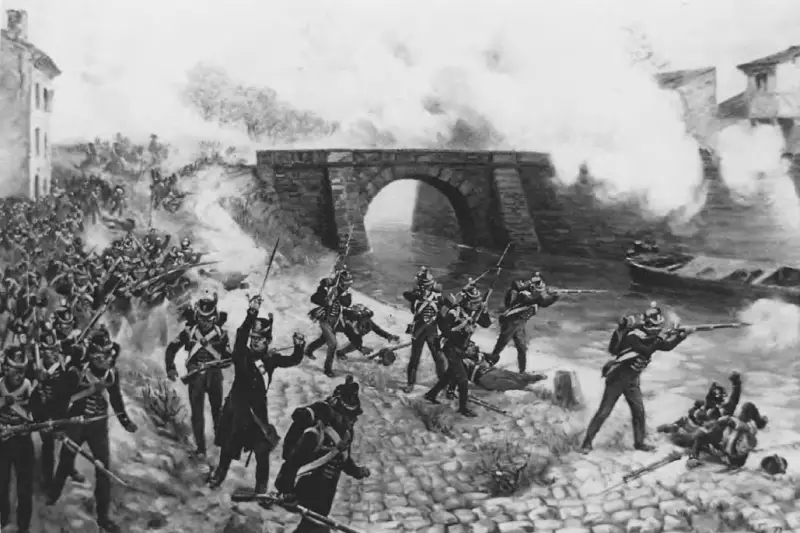
British riflemen fire during the Battle of Toulouse. A. Dupre
Napoleon Bonaparte wandered almost alone through the deserted halls of the palace, reflected, and shared his thoughts with Caulaincourt. I carefully read the newspapers and learned that many of my marshals had joined the new government. I was sad that I didn’t die on the battlefield.
On April 12, he took poison - potassium cyanide, which he had been carrying with him since the campaign in Russia (he was almost intercepted by the Cossacks near Maloyaroslavets). However, the poison apparently fizzled out within two years. Napoleon suffered, but by morning his body overcame the poison.
On the same day, Napoleon confirmed his act of abdication. Napoleon and Marie-Louise retained the titles of Emperor and Empress, but lost power over France. Their heirs were also prohibited from laying claim to the French crown. Napoleon was given the island of Elba for life and retained the honorary title of emperor.
On April 20, 1814, Napoleon left Fontainebleau and went into exile. He was accompanied by a guards battalion.
Before leaving, the emperor said goodbye to his soldiers: “Soldiers of my Old Guard! Farewell! For twenty years, you accompanied me in the field of honor and glory... you never ceased to set an example of courage and fidelity. With people like you, our cause was not yet lost, but I did not want to continue an endless war, perhaps stir up an internecine war that could aggravate the misfortunes of France. I sacrificed myself for the fatherland, you, my friends, continue to serve it... Farewell, my children!.. I would like to press you all to my heart, so let me hug your banner!
Napoleon approached General Petit, who was holding the banner of the Old Guard, hugged him and kissed the banner. With loud exclamations and sobs from many experienced soldiers, the emperor got into the carriage.
Along the way, part of the way, Napoleon was greeted with exclamations: “Long live the Emperor!” Death to foreigners! But in the south, where the royalist positions were strong, he was already haunted by cries wishing for death. In one place, the mob almost tore Napoleon to pieces (he himself was afraid of this, he said that it was better to fall in battle than to fall into the hands of a crowd that hated him). But he was saved by Count Shuvalov, who accompanied the emperor.
On April 28, Napoleon boarded the British frigate Neustrashimy and a few days later was on the Elbe.
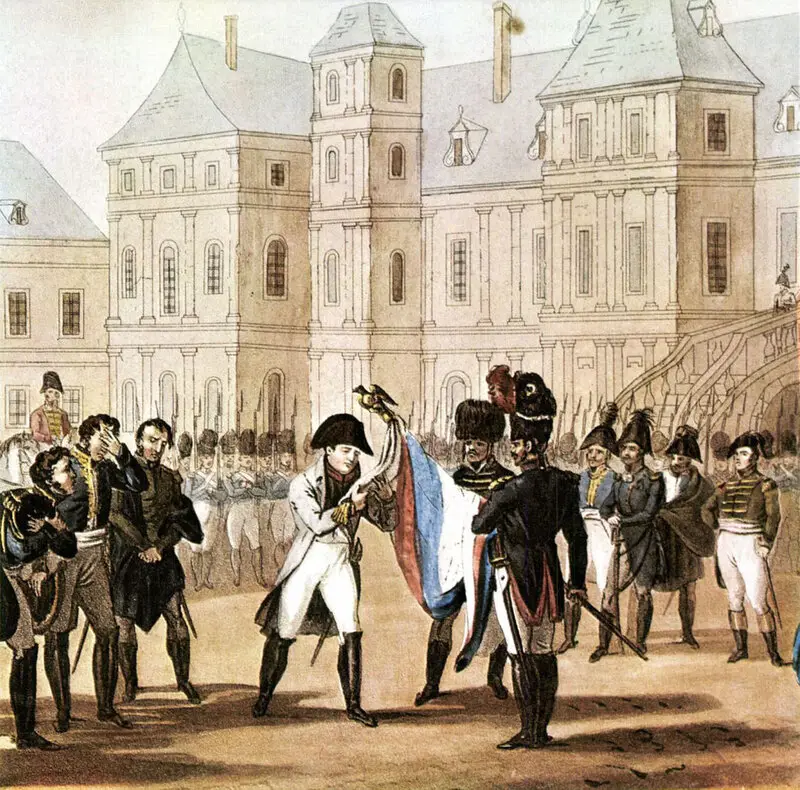
Napoleon's farewell to the Imperial Guard at Fontainebleau. April 20, 1814
Information